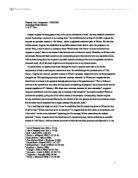Property Law
Land Registration Act 2002 and the repeal of the Land Registration Act 1925, the system of registration was substantially reformed1. Property is not merely 'things' but things which somebody claims to own2. A landowner "owns" no more than a space, though he may also claim to own anything which is contained within that space3. Rose is a beneficiary as she has contributed to half of the purchase price, this constitutes as an implied trust where you rely upon the statement made by the trustee. Since the land was registered in Major Thorns name as a sole proprietary, Rose will argue that her interest is overriding and bind Mr Hay. Overriding interests are rights which bind the registered proprietor but is not protected on the land registration4. In the case of Williams & Glyn5 the bank was bound by Mrs, Boland's interest because she was in actual occupation and no enquiry was made by the purchaser. Court Of Appeal stated 'a wife who has a share in the house had an equitable interest in the land and actual occupation is a matter of fact and not law'. In addition, Mr Hay would be binding upon the beneficiary interest as Rose was not in occupation at the time of the sale and assume she is the wife of Major Thorn, actual occupation was a 'matter of fact and not law'. Lease over 7 years is binding; however a lease under 7 years can still be protected as it is capable of being
Property Law
PART A Rainbow cottage is an estate in fee simple absolute in possession, meaning Mr. Brown has absolute rights over his property. Mr. and Mrs. Green who intend to purchase the property were impressed by some items on the estate. The LPA 1925 s62(1)1 ensures that all buildings, erections, fixtures, hedges and fences are conveyed with the land, but s62(4)2 states that such items will not be conveyed with the land if there is a contrary intention expressed in the conveyance. Mr. Brown had not returned the questionnaire relating to fixtures and fittings, contrary to the Law Society's Conveyancing Protocol which states the vendor must exclude any item from the sale which he intends to keep. If this is incomplete the matter will be decided under common law rules. After the sale Mr Brown takes some items with him. S 205 of the LPA3 1925 mentions buildings as forming part of the land, which is further developed as any item affixed to the land becomes land itself. When deciding whether an item brought onto the land is a fixture or a chattel will principally depend on a two fold test, the degree of annexation and the purpose of annexation. This test evolved from the case of Holland v Hodgson (1872)4, in which Blackburn J highlighted its importance suggesting that only an item which is firmly fixed will become part of the land. The first question will depend on whether the
Property Law
Property Law: Assignment 1 2002/2003. Amandeep Singh Gahunia. LLB 2nd Year. Despite Augusta not being party to any valid express declaration of trust1, she may establish a beneficial interest by proving a constructive or resulting trust.2 By contributing her savings of £25,000, Augusta has acquired an equitable interest in 'Old House', which is registered under the name of Wilson. The fact that another person, Augusta, has established an equitable interest means that in equity the property is co-owned. Thus, a trust of land is in existence where Wilson holds 'Old House' on trust for himself and Augusta in equity3; there is one trustee of the land and two co-owners in equity. Therefore, as Wilson is the only trustee, Savequick Bank cannot rely on overreaching to give them priority over any equitable owners, with the bank being bound by Augusta's equitable interest according to the rules of registered land (to be discussed later), which the bank might have not discovered due to its informal nature. As stated before, no express trust exists although the facts in question seem able to fit into the requirements of both a resulting and constructive trust. By contributing to the purchase price of 'Old House', Augusta can claim an equitable interest in Wilson's property, despite her name not being registered alongside his. This resulting trust arises from the 'common intention'
Property Law
Section A In light of the feedback I received from part one of the workbook, I will do the following 5 things differently and the following 5 things the same as shown below: 5 things I will do differently: . The arguments that were raised within my answers were accompanied by examples but the issue being brought forward lacked development. Further development of an issue raised requires me to link the example I have used to the question I am answering. In order to develop the answer, there needs to be a discussion on my part to show for example what the example means in terms of my answer; this need's to be shown with more clarity via my own discussion. Hence my discussion should aim to answer the and so what? why? what? when? questions. By applying relevant examples with relevant discussion geared to answering the question it will enable me to bring out the points I am raising more fully. 2. In section B of part one I raised a point in the early part of the short report but did not give an example to show what I was trying to show. Instead I used an example later in my short report which was very relevant to the issue raised initially; I should have used it in what I was stating earlier in the report to give richness to the point I raised earlier. Hence I need to carefully plan my answers with relevant examples to the question being answered. 3. In part one, section B,





